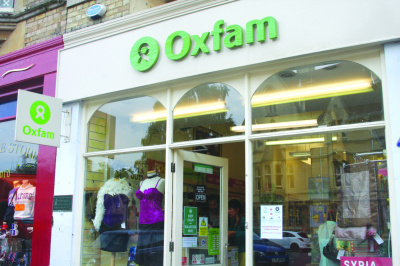Ethical consumption: another trend of second-hand culture in UK , Oxfam spreads spirit of charity through second-hand goods

Ethical consumption: another trend of second-hand culture in UK
One of the unique aspects of second-hand trade in the UK is that it does not only benefit buyers and sellers, but also the socially disadvantaged. Throughout history, the UK has preserved its own tradition to help others using second-hand goods as a medium. People who engage in the charity donate their time and labor for the good of society.
“Charity has been one of the UK’s main practices since the nineteenth century,” said lecturer Kim Hun-seok (Seoul National University), who has written a paper on the history of the UK’s charity. “The concept is rather different from noblesse oblige, which requires only the wealthy to care for the needy. Charity in the UK is a responsibility taken by all classes.”
Ethical consumption, also called ethical consumerism, is a type of consumer activism that is practiced through “positive buying.” Positive buying favors ethical products that are recycled and re-used. The concept was first encouraged in the UK through the Ethical Consumer Magazine. Ethical consumers place more emphasis on the result of their purchase rather than their own gain. People in favor of ethical consumption also stress that buyers can make society a better place just by consuming ethically.
Ethical consumption has long been practiced in charity shops, which is one of the oldest forms of second-hand trade in the UK.
“The first charity shop to start in the UK was Oxfam, which opened in 1949,” said professor Nicky Gregson (Durham University), who wrote a paper on second-hand culture. “Recent forms of second-hand exchange started in the 1990s, such as the car boot sales, and online second-hand exchange only took off post 2000.”
There are numerous charity shops on the streets of London that aim to subsidize different disadvantaged social groups, including abused children or the disabled. All of the charity shops engaged in ethical consumption are comprised of volunteers who work for no income and encourage ethical consumption among others.
“I think participating in second-hand trade is one of the most practical ways to help others,” said Ari Dibben, a volunteer in a charity shop. “It does not only benefit the needy, but also those who donates unwanted goods and people who buy these items. All the people who participate in the procedure can gain something.”
Most volunteers believe that the charity shop is an effective measure to benefit all members of the society in widely and various ways.
“The UK’s second-hand culture has evolved organically, and from what is known here as the social economy,” professor Gregson said.

When Greece struggled from famine during the World War II, people in the UK gathered their used clothes and belongings to save people from extreme poverty. This altruistic act became the start of Oxfam.
Founded in 1942 in Oxford, Oxfam has developed itself as one of the most well-known charity organizations around the world that practices ethical consumption. Oxfam is a global humanitarian and campaigning organization working with others to overcome poverty and suffering.
“We work to find lasting solutions to global poverty and injustice,” said Andrew Horton, the trading director of Oxfam.
Oxfam has around 700 shops on high streets across the UK, selling donated goods.
Oxfam is now working in nearly 60 countries on a variety of projects, from providing emergency water sources to supporting community projects. For every one pound donated to its general funds, 83 pence is spent on emergency, development and campaigning work; 10 pence is spent on support and governance; and 7 pence is invested to generate future income.
To be a part of this ethical consumption process, aproximately 22 thousand volunteers are willingly contributing to Oxfam’s purposes.
“There are thousands of volunteers with thousands of different reasons for volunteering,” said Daniel O’ Driscoll, the volunteering manager at Oxfam. “People have different features that they can donate. Some can donate money, while others are able to share their time. Oxfam appreciates all of these offerings.”
Oxfam also encourages university students to find their own ways to facilitate ethical consumption on campuses. Most of the universities in the UK have an Oxfam Society, an organization where university students gather to spread the spirit of Oxfam around their schools.
“Oxfam Society aims to unite all members interested in alleviating poverty and offering help to those suffering both locally and globally,” said Kristie Thacker (University of Nottingham, 4), the president of Oxfam Society at the University of Nottingham.
Oxfam society encourages university students to take part in second-hand trade, especially in charity shops where they can help other people through consumption and volunteer work. By spreading the value of second-hand and helping others on campus through Oxfam Society, the members hope to maintain the successful adoption of second-hand culture in the UK.

